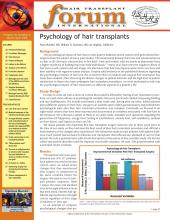Background
The psychological impact of hair loss in male pattern baldness and in women with generalized thinning has been the subject of many past studies. The relationship between hair loss and emotional stress is clear to all clinicians who practice in this field.1 Men and women who are prone to depression have a higher incidence of balding than non-bald individuals.2,3 Many of us have seen the negative effects of hair loss on self-esteem and self-image. We also know that hair loss impacts some men’s sex lives and their stability with regard to career choices. Despite solid evidence in the published literature regarding the psychological impact of hair loss, the corrective effect of medical and surgical hair restoration has never been studied. After observing the drastic changes in patient behavior and the high level of patient satisfaction in those who have undergone hair transplant procedures, we were motivated to look into the psychological impact of hair restoration on different aspects of a patient’s life.
Study Design
In order to come up with a series of criteria that could be affected by having a hair restoration procedure, we used some indexes of psychological variables that were previously studied comparing balding and non-balding men. We initially performed a pilot study and, during post-op visits, asked patients about different aspects of their lives. We gave our patients open ended questionnaires and probed their psychological state after their hair restoration procedure was complete. Eventually we focused in on eight major criteria that have been reported and documented as variables associated with hair loss in the literature. We collected a subset of them in our pilot study. Included were questions regarding the general level of happiness, energy level, feeling of youthfulness, anxiety level, self-confidence, outlook on their future, and impact on their sex life.
We chose patients who had their first hair transplant surgery between one to three years prior to the time of our study, so they had seen the final result of their hair restoration procedure and still had a fresh memory of the changes they experienced. We limited the study to male patients with pattern baldness. Each patient had exclusively follicular unit transplants that reflected our standard of care for that period. We sent a questionnaire with a brief description of the nature of this scientific study. We did not collect any patient identifiers and the response was totally voluntary. We sent 200 questionnaires with a stamped return envelope.
Results
The response rate to our questionnaire was 18% (37 patients). Each patient was used as his own control since we asked about changes that they experienced after surgery in comparison to the same variables before the surgery. We used a t-test to compare patients’ responses. Table 1 shows the mean and standard error in the eight different criteria that were asked. Patients had significant improvements in all eight criteria regardless of their stage of baldness or their age.
Improvement of eight assessed variables in male balding patients who had their first hair transplant surgery between years 2004 and 2006.
In an attempt to compare psychological changes that patients experienced in different stages of baldness, we divided patients into two groups: (1) those who had Norwood IV patterns or less and (2) those with Norwood V patterns and above. We observed the most significant change in two categories: sex life and career experience. Patients with less balding had a greater impact on their sex life and career when compared to patients who had more advanced stages of hair loss. These changes were not age related.
Comparison of post-surgical psycho-social improvements between balding patients with low (Norwood III–IV: Pink columns) and high classes (Norwood V–VII: orange columns) of hair loss.
Comparison of post–hair transplant psycho-social improvements between younger (below 40: Yellow columns) and older patients (40 and over: green columns).
We also compared younger and older patients to determine if there was any significant difference between the two groups. The index that changed more significantly for the younger patient was the impact of hair transplants on their future outlook.
Conclusion
The results confirmed our clinical observations. Hair restoration surgery can affect many aspects of a patient’s life and can potentially reverse psychosocial problems associated with hair loss. In the early stages of hair loss, patients may have more awareness of their condition and they might be more affected than men in the later stages of hair loss.
Patients who experienced hair loss at an early age while involved in an active social life were more prone to the negative side effects of balding and appeared to benefit most from hair restoration procedures. These patients’ negative outlook seemed to reverse after surgery.
Low response rates from blind mailings have always been a drawback in questionnaire-type studies. We received responses from 37 out of the 200 questionnaires that were sent out for a response rate of 18.5%. Giving incentives to responders may be a good way of increasing the participation rate. We presented these results at the ISHRS Annual Scientific Meeting in Las Vegas and have been contacted by many of our colleagues who expressed interest in collaborating on a larger study. We are currently trying to acquire funding for repeating this study and hope to optimize our response rate and improve the statistical value of the study.
- Copyright © 2008 by The International Society of Hair Restoration Surgery









